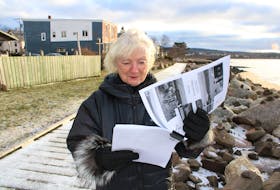But teacher Cheryl Bourque-Wells of Yarmouth County and parent Amy MacKinnon of Shelburne County both feel they have a lot to offer to the process.
Bourque-Wells, a junior high teacher at Drumlin Heights Consolidated School, was among the nearly 800 teachers to apply for the council. She’s been teaching for nearly 21 years and says she’s seen many changes – “some good, some not so good.”
The Liberal government included the Council to Improve Classroom Conditions in legislation that also imposed a contract on teachers following three rejected tentative deals.
Bourque-Wells wants to be part of the dialogue to help bring about changes for teachers. In addition to teaching at the junior high level, she was a full-time math mentor and the school she teaches in is a P-12 school.
But teacher Cheryl Bourque-Wells of Yarmouth County and parent Amy MacKinnon of Shelburne County both feel they have a lot to offer to the process.
Bourque-Wells, a junior high teacher at Drumlin Heights Consolidated School, was among the nearly 800 teachers to apply for the council. She’s been teaching for nearly 21 years and says she’s seen many changes – “some good, some not so good.”
The Liberal government included the Council to Improve Classroom Conditions in legislation that also imposed a contract on teachers following three rejected tentative deals.
Bourque-Wells wants to be part of the dialogue to help bring about changes for teachers. In addition to teaching at the junior high level, she was a full-time math mentor and the school she teaches in is a P-12 school.
She also says she put her name forward to show government that many people feel change is needed.
“They need to know how many people want to make changes and I wanted them to see that number, with me included,” she says.
The council will help determine how $20 million will be spent in the classroom over two years to address concerns and issues raised by teachers.
Bourque-Wells notes the workload and demands on teachers has drastically increased over the years and needs to be addressed.
“I’m seeing good young teachers coming into the system that can’t cope because the demands are too much and it’s not fair to them and it’s not fair to our students,” she says.
Parent Amy MacKinnon also looks forward to helping to shape change.
“I feel incredibly honoured to have been chosen from what I believe to have been a list of other wonderful hardworking and passionate parents,” she says, calling the work ahead a very important undertaking.
MacKinnon volunteers at her school and is part of the school advisory council and a Schools Plus advisory council. Her son Jacob is a student at Forest Ridge Academy.
She admits a lot of responsibility comes with being the only official parent representative on the council.
“I am feeling anxious about representing Nova Scotian parents as they are a very diverse population with many different needs,” she says. But having worked and contributed professionally and personally in many schools across the county gives her some unique experience, she says. She looks forward to bringing her perspective to the table.
“How could I say no to the opportunity to hopefully be a part of making some real tangible change?” she says.
The council will hold three days of meetings in Halifax starting on March 21, with initial recommendations coming from the council no later than April 28.
"This council is an opportunity to work collaboratively to address issues teachers have said are impacting the classroom environment," says Education and Early Childhood Development Minister Karen Casey. "I look forward to the recommendations the council brings forward to improve our education system."
Bourque-Wells says she’s been getting good response from colleagues about her appointment to the council. She’s looking forward to bringing their suggestions and voices to the table in addition to her own.
THE COUNCIL MEMBERS:
• Sean Barker, Antigonish Education Centre
• Mélanie Belliveau, École Acadienne de Pomquet, Antigonish County
• Cheryl Bourque-Wells, Drumlin Heights Consolidated School, Yarmouth County
• Elizabeth Brideau-Clark, Bayview Community School, Mahone Bay
• Michael Cosgrove, Dartmouth High School
• Melanie Morrissey, Bible Hill Junior High School, Colchester County
• Reagan O'Hara, Avon View High School, Windsor
• Kerri Lynn Power, Memorial High School, Sydney Mines
• Rachel Ross-Mantley, Central Spryfield Elementary
• Myles Fox, grade 10 student at Cobequid Educational Centre, Truro
• Amy MacKinnon, parent, Shelburne County
• Pamela Doyle, guidance counsellor at Lockview High School, Fall River
• Joan Ling, executive director of the Nova Scotia Teachers Union and council co-chair
• Sandra McKenzie, deputy minister of Education and Early Childhood Development and council co-chair.
Biographical information about the council members can be found at www.novascotia.ca/classroomcouncil
MORE ABOUT THE COUNCIL:
The classroom teacher positions were chosen by school board superintendents, who worked with board staff in selecting candidates. The superintendents submitted their selections to the government and the Nova Scotia Teachers Union on March 7.
The government’s appointees are a student, a parent, and a guidance counsellor.
The council will have $20 million to put into the classroom over two years to address issues that have been identified by teachers. These include:
• data collection and reporting
• assessment and evaluation
• timing of administrative days relative to report card preparation
• student attendance policy
• technology and work processes, including PowerSchool and TIENET (Technology for Improving Education Network
• planning for student success
• complex classrooms
• class sizes at all grade levels
• student discipline policy









